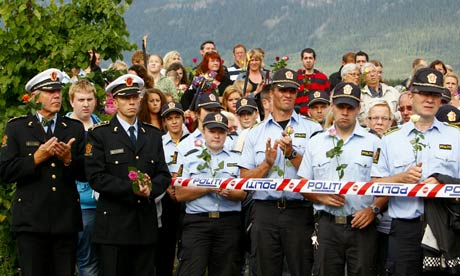
Norwegian police have given their most detailed account yet of how Anders Behring Breivik surrendered after killing 68 people on Utøya island and eight in the bomb attack the same day in Oslo.
"When we get closer to the place where there's shooting we started to use our voices yelling 'armed police' to draw the attention to us," Haavard Gaasbakk, the squad leader of the police unit that arrested Breivik, told the press. "We come to a forested area and the suspect stands there right in front of us with his hands high above his head. It was a completely normal arrest."
The Norwegian police have been criticised for their failure to reach the island of Utøya sooner on 22 July, the day of the massacres.
Breivik's lawyer said his client was surprised to have reached the island youth camp without being stopped by any police. Officers were reported to have taken 90 minutes to arrive at the site and it emerged that the nearest police helicopter available could not intervene as the pilots were on holiday.
But Knut Storberget, Norway's justice minister, praised the police and anti-terrorism teams, saying they had helped "limit the tragedy".
The leader of the country's emergency delta force unit, Anders Snortheimsmoen, separately said his officers nearly shot Breivik because they feared that he could have been wearing an explosive belt. A decision was made by a "very narrow margin", he said.
Snortheimsmoen defended his unit's response to the atrocities, claiming the problems with the team's boat caused no significant delay in getting to Utøya. He said that though the boat broke down the team were immediately able to use an alternative vessel. The team arrived at the harbour at the same time as local police.
Earlier, the Norwegian prime minister, Jens Stoltenberg, said his country would "not be intimidated or threatened" by the terror attacks, which left 76 people dead. The country would "stand firm" in defending its values and the "open, tolerant and inclusive society", he said on Wednesday. He added: "The Norwegian response to violence is more democracy, more openness and greater political participation."
The horrific and brutal attacks were an assault on Norway's fundamental values, Stoltenberg said. "We have to be very clear to distinguish between extreme views, opinions that it's completely legal, legitimate to have. What is not legitimate is to try to implement those extreme views by using violence."
Norwegian media have suggested police knew Breivik's identity before they reached the island, tracing him through a rental car firm from whom he hired a van in which the Oslo bomb was planted.
Dag Andre Johansen, Scandinavian chief executive of the Avis car rental company, told Associated Press that Breivik had rented two vehicles, including a Volkswagen van. Police contacted the company after the bombing and confirmed Breivik's identity. But Johansen declined to say whether that contact preceded Breivik's arrest on Utøya.
Police meanwhile detonated a cache of explosives at a farm rented by Breivik. Detectives believe the 32-year-old made the bomb using fertiliser he purchased ostensibly for vegetable cultivation.
The controlled explosion came after police named four of the victims, including three caught up in the Oslo bombing and a 23-year-old shot dead on Utøya. Police would not reveal the quantity of explosives found at the farm in Rena, about 100 miles north of the capital.
As the investigation continues security officials have cast doubt on Breivik's claims of having accomplices who are still at large. At his first court appearance in Oslo, on Monday, he told a courtroom he had links to "two other terror cells".
But Norway's domestic intelligence chief, Janne Kristiansen, said no proof had yet been found to link Breivik to rightwing extremists in the UK or elsewhere. She told the BBC: "I can tell you, at this moment in time, we don't have evidence or we don't have indications that he has been part of a broader movement or that he has been in connection with other cells or that there are other cells."
Kristiansen added that she did not believe the killer was insane, but that he was "calculating and evil, and someone who sought the limelight".
At a press conference in the capital, Johan Fredrikson, chief of Oslo's police, said that he still had no evidence of an accomplice or network behind the attacks, despite an international investigation involving British police.
On Wednesday morning, Oslo's main station was closed after a suitcase, thought suspicious, was discovered on a bus. All train and bus services out of the centre were halted while police investigated. The luggage turned out to be harmless.
Oslo police also caused some panic by putting out an alert saying they were looking for a "dangerous and unstable" man who claimed a connection with Breivik. But shortly after releasing the alert police said they had wrongly connected a mentally ill man with the massacre last week. "This has nothing to do with Friday's case," a police official said. "The news release was sent out in error. This is a routine mission by the police."
Norwegian investigators have assigned an entire unit to examine the 1,500-page manifesto that Breivik emailed to more than 1,000 contacts less than 90 minutes before he launched his attacks.
One paragraph in Breivik's diatribe describes a "survivor's kit" containing weapons, ammunition, cash and food, a kit he claimed to be preparing to help him break out of jail. The Norwegian tabloid VG says Breivik described plans for another terrorist attack, following his escape from jail, which included a hit-list of targets.
No comments:
Post a Comment